- Home
- Anne McCaffrey
Powers That Be Page 4
Powers That Be Read online
Page 4
She watched the person waddle away; then, feeling sillier than ever, she fell into a waddling gait until she reached her own door, the last one on the row.
Something bright flashed ahead of her as she opened the door, and she stiffened, until she heard a thud from the direction of the table and beheld one of the orange cats sitting upon it, nonchalantly cleaning the snow from furry paw pads.
To her relief, the log she had left burning in the stove earlier that morning was glowing coals. She wasn’t sure how long such primitive material was supposed to last, but she had the impression it needed refurbishing frequently. She stripped off coat, gloves, muffler, and coverall and sat down on the chair in her uniform. She had best strip off the insignia. She sighed. That would be admitting to her present status. Whatever. She wondered what she would do for clothing here when her uniforms wore out. She had no other kind of clothing, having been shipside most of her life. Considering the assorted outerwear she had seen in Clodagh’s, perhaps the locals had indigenous sources and supplies. She would have to ask Bunny where she got her furs. Meanwhile . . .
She spread the brief on the table, while the cat looked on inquisitively. The report contained a short history of Petaybee and its settlements, as well as maps showing the resource sites and the spots where the missing survey teams had last been seen.
Petaybee: third world from star XR798 in the Valdez system. The original evaluation team found no life-forms, sentient or otherwise, on the planet: the rocky surface was largely frozen during most of the solar year. The Whittaker Effect was suggested as the best terraforming package for the planet and was inaugurated. Colonization was feasible, and procedures were initiated as the planet warmed. The only land-masses available were in the polar regions, where the climate was subarctic, with a long extremely cold winter, temperatures frequently as low as or lower than -100 degrees F, summers barely two Terran months. Daylight is intense and almost constant during the summer, but dwindles rapidly into total darkness for most of the winter. Suitable colonists were chosen from ethnic groups accustomed to such conditions.
Knowing Intergal’s ways, Yana doubted the “ethnic groups” had been asked their choice in the matter. She kept reading.
. . . following initial seeding, adjustments were made on-site by company staff members among the colonists. The team determined that although the planet could support life of a primitive sort, most low-level machinery and electronics would not withstand the cold. Therefore, biological alternatives were developed. Company botanists perfected food and fodder crops, and other domesticated plant life specially designed for the Petaybean growing season. Summer thawing of rivers and shorelines is facilitated by the planet’s network of subterranean hot springs, which to some extent warm the surface water, which becomes warmer as it deepens, preventing all but the shallower streams from freezing to their total depth. This deep water, along with hot springs occurring on the planet’s surface and open year-round, and small quantities of melted snow, provide hydration for plants, humans, and animals.
Company geneticists also altered existing animal species to conform to the requirements of the Petaybean climate. The following species were developed under company auspices: Petaybee curly horses, for nonsnow and heavy-duty transport; fox-hounds, intelligent hybrid dogs for pulling sleds; domestic felines, originally for fur-bearing purposes but later to control the vermin, the development of which was not authorized. Additionally, fur-bearing species able to sustain themselves in the wild were introduced and specially adapted for the climate—wolverines, wolves, bears, lynx, as well as caribou, reindeer, wild sheep, and moose.
Sounded right to Yana. Just about what one would expect a fully stocked subarctic Earth clone to have. She had done the Service and London interactive holos as a kid. The only thing missing so far was the malamutes, as in Malamute Saloon, and the fox-hounds seemed to be standing in for them. Too bad there wasn’t a continental mass along the equator that would be more temperate. But even with long-term terraforming, one couldn’t always choose appropriate sites for continental masses, though she didn’t know the geology involved in supporting Gaias.
She skimmed past the description of ocean and river dwellers, noting that some long-extinct species on Earth had been revived for this planet, making the terraforming valuable for that purpose if no other, in her estimation. Five kinds of whales populated the ocean: orcas, humpbacks, grays, rights, and the small so-called pilot whales, as well as dolphins, otters, seals, walruses, and all of the fish and plant life necessary to support them. The only odd thing about Petaybee was that the oceans were still many times warmer deep down than they were upon the icy surface, since considerable geothermal activity was still taking place following the terraforming. This same activity accounted for volcanos, hot springs, earthquakes, and the odd domes the Irish-Yupik-descended colonists of this continent called “fairy hills,” the report noted.
Yana flipped forward. Nothing irregular here yet that she had to memorize and eat. Nothing she shouldn’t know—or be able to ask about, for that matter. If it was here and it was authorized to be here, it was no doubt a matter of public record.
The next aberration she found was a notation that it had been unnecessary to develop a methane-based energy system when, by the time enough colonists had settled the planet to make such considerations a priority, it was discovered that the smallish alder trees transplanted to this planet had somehow mutated far beyond the alterations of the company botanists, into a completely new hardwood that made unusually long-burning and hot fuel. That explained why her homefires were still burning, anyway.
But in the last part of the report, she began to wonder if the computer’s word processor hadn’t gotten scrambled with some kid’s IAH game. One of the expeditionary team members, prior to her complete disappearance, had reported via land-to-ship voice transmitter that she had seen what appeared to be a unicorn. Unicorns were definitely not among the authorized species for this planet, or any other. The official theory, the report went on to say, was that the woman had suffered from snow blindness or hallucinations induced by hypothermia. This climate was hostile to those not bred to adapt to it, the report rationalized. One team member who did return from that expedition appeared to have aged at least a decade and had patently gone insane, babbling about hearing voices from the soil and tree roots, though the reports he gave of crystal caverns led the authorities to hope that there was some thread of reality in his ramblings.
The locals, both company employees and dependents, denied knowledge of crystal caverns or any of the other anomalies but did admit that sometimes they too suffered from cold-induced hallucinations, particularly when out on the trail with their teams.
Yana rubbed her fists through her hair and put the report in the stove. Like a lot of company paperwork, it didn’t actually say much that couldn’t have been conveyed in a short verbal briefing. Disgusted, she watched the papers burn, the cat poking its nose around her arm to see into the stove as well.
“I’m going to have to take you back to Clodagh’s tonight, kittycat,” she told it. It blinked golden eyes at her. “At least with so many like you stalking about, she’s unlikely to have missed you.”
Just then there was a thump at her door, and she called out to whoever it was to come in. By the time she realized no one was coming and had closed the stove door to investigate, the area in front of the house was as empty as it had ever been—but a bundle of wood sat beside the stoop.
Yana pulled it inside, although it could as easily have remained out in the dry, freezing air. She wanted whoever had brought it to know she had found it and planned to use it, since so far she wasn’t sure how she was supposed to acquire provisions and today, at least, she didn’t have enough energy left to investigate. She had given the bed quilt back to Bunny, thinking she would get a new one today. Belatedly she realized that the bundle Charlie Demintieff had been carrying might have contained her thermal blanket and other authorized survival gear. In the confusion,
it had been left at Clodagh’s.
The cat looked up at her expectantly, and she sat back down at the table, wishing she had a console to work on. Nothing to read, write, work at, or interact with unless she wanted to put all those clothes back on and tramp about in the cold. The cat looked up at her and mewed.
“Just as well we’re taking you home tonight, beast,” she told it, giving it a stroke. “Otherwise I’d go buggy, landed with so much solitude all of a sudden.”
As if it understood her, the cat chirruped and hopped down from the table, where it began chasing the toggle string of her parka with every evidence of great concentration and ferocity. It leapt high with front paws spread and twisted in midair to land squarely upon the coat’s drawstring. Then the cat sat down, gave its paws a lick, and looked up at her expectantly. Other than the coat’s drawstring, there wasn’t a single thing to dangle or roll in the cabin.
Finally Yana took off her webbed uniform belt and dragged the buckle on the floor for the animal to hunt, while it did its best to entertain her. After a while, they both fell asleep by the stove, Yana with her head on the table, the cat curled by her elbow, while the winter-muffled village of Kilcoole remained unnervingly free of clanging, computer beeps, and the hivelike activity of spacers.
Yana’s sleep was light and her dreams fragmented with scenes of a surgeon using a horn growing from his head as a scalpel, twenty young troopers convulsing while clawing at a hatch as poison gas slithered into a hold that looked something like a crystal cave, and a tiny man she knew was Charlie Demintieff being pounced at by an orange cat.
Diego Metaxos hadn’t been all that thrilled about being dragged down to Petaybee to watch his old man in action as a geological surveyor. In all of his sixteen years, he had never been planetside, and he expected life on Petaybee to be as dreary and routine as life on board ship. But when he saw the place, he was glad he had come, and when he met the dogs, he was even gladder. By the time the lady let him drive her dog team, he had been convinced that this trip was the most brilliant thing that had ever happened to him.
At first he had been freaked out by the whole idea of the expedition, and with good reason. Even the shrink on his dad’s ship had told him that he had had a lot to be freaked out about recently. First of all, his mom had fallen for a company exec who liked Mom fine but didn’t want any other attachments. Mom, a senior astrophysicist, had never exactly been the warm type, and Diego had spent most of his life moving with her from ship to ship, or watching her come and go from various assignments while he sat in front of a teaching computer. Lots of the places Mom was assigned, there had been no one his own age, and very seldom did he find an adult who wanted to be bothered with someone else’s kid. At the last couple of stations, he had begun to pal around with a few of the younger corps troops, listening to their casual conversation and admiring the hard-core way they handled themselves, but he was always conscious that he wasn’t really one of them, and in case he forgot it, his mother made no bones about her displeasure in his choice of company. Then, too, about the time he started to gain a little acceptance and make one or two friends, they moved to a new station. He then had to fall back on the resources he had developed since he was a little kid, a good imagination and a quick brain. He didn’t really need any friends. Both his mom and his dad were brilliant, self-sufficient people, and he was, too. All he had ever needed was computer access, and he could entertain as well as educate himself. He was good at languages, having started out speaking both Spanish and English from when he was a little kid, and he enjoyed reading actual old hard-copy stories in both languages when there was nobody he wanted to hang around with, so he got by.
He had gone to visit his dad and Steve about once every calendar year, and that was okay. He really loved his dad, even though he was a little on the perfectionistic and ultraserious side, except with Steve. Steve got him to knock it off, to relax and laugh a little. Steve was always finding neat things to share with them. He had given Diego his first hard-copy book—a Spanish-language text of Don Quixote—for Diego’s ninth birthday.
“Pay close attention to Sancho Panza and Dulcinea,” he had kidded Diego. “I’m a little of both.” He struck a flamenco pose.
No wonder Dad and Mom hadn’t gotten along. Even if Dad hadn’t discovered he was gay, he and Mom were too much alike, both studious and serious and very literal-minded. So Diego didn’t mind Dad and Steve’s arrangement all that much; it just had never occurred to him that he might end up living with them.
He had just begun to get used to that—and he had even come to find out that Dad had wanted him all along but had been second best when it came to custody because in the eyes of company management theirs was a less-preferred sexual orientation to Mom’s. Diego didn’t see what difference that made. Nobody tried to tell him which way to swing, even if he had been ready to do any swinging of any kind. So far, he hadn’t met anyone who instilled in him a desire to implement the procedures his manuals and texts described.
So he had just been getting used to his new situation and settling in when Steve had come down with some kind of virus just before Dad was due to take off for this mission to investigate something or other on Petaybee. That was when Dad had gotten the bright idea that Diego should come along, too, as his assistant instead of Steve, and “broaden his horizons.”
In fact, he hadn’t actually seen a horizon before, since he was in it, by dirtside reckoning. Pointing this out had caused Steve to rasp at him not to be a smartass and to give new experiences a chance. So he had come along, and to his surprise, the landscape of Petaybee looked more open and spacious than, well, than space.
But where space was black, Petaybee was blue and white, even when it turned dark, as it quickly did on their way from SpaceBase to the dinky little town where their guides met them. The sky was sort of dark ivory, and he could still see Petaybee’s sun, like a small snowball hanging in the sky, as well as its two moons, one organic and one company-manufactured, in the sky.
Being here was sort of like being inside the moon, all pale and shining. SpaceBase was a hole and the town was ugly, but the countryside was really pretty fascinating, and the snocle ride into Kilcoole seemed all too short. The place was so much like something from his books, and yet so different that he knew he would never forget it even if he didn’t decide, as his father obviously hoped, that he would become a great geologist like his old man.
Then, when they started unloading the equipment from the snocle, and a whole fleet of dogs, about fourteen to a sled, pulled up in front of the station, he started getting hooked.
The dogs were the most beautiful creatures he had ever seen. They were red as a Mars moonscape but delicately featured with foxy, intelligent faces. At first their barking scared him a little bit, but then the lady—when she spoke he could tell she was a lady—driving his sled said they were friendly and he could pet them if he liked. They were soft! The tops of their coats were a little icy, but when he took his mitten off and dug into their fur with his hand, it was as soft as anything he had ever felt, and warm enough to keep his hand from freezing before he stuck it back into the glove. As he was bending over to pull the mitten back on, the dog licked his face. “Hey, boy!” Diego said, and hugged him.
“Girl,” Lavelle, the driver, said. “That’s Dinah, my leader. She likes you, and she’s a good judge of character.”
“Leader?”
“The dog I talk to, and the one who tells me and the other dogs what’s going on up ahead, what to do. As you can see from this arrangement, mostly all the other dogs see is the rear end of the dog in front of them.” The dogs wagged their curled feathery tails and grinned as if that was a great joke they all shared.
He rode with Lavelle while his dad rode in the sled in front of them. The other members of the expedition, two women, one a seismographer and one a mining engineer, and the man his dad said was a soil mechanics specialist, all of them Doctor Somebody-or-other, rode in the other sleds.
&nbs
p; It was a great ride, bundled along with the supplies into the furs on the sled, bumping and whisking over snow and ice while the dogs ran ahead, tails bouncing. But the best part was when, once they were well out of town with nothing much in the way, Lavelle let him drive.
“When you want them to go, yell to Dinah, ‘Hike!’ and ‘Gee!’ if you want them to go right, ‘Haw!’ to the left, ‘Whoa!’ when you want them to stop. Dinah will do it and see that the others do it. She’s a smart pup. You stand here.” She showed him the rough hair-hide strips along the runners where he could put his feet without slipping. “The brake is here. Step on it if you want to stop, but you won’t stop very quick on ice.”
The other sleds all passed them, but Lavelle didn’t care. As soon as he had his hands on the handlebars and his feet on the treads and Lavelle had strapped on the nets made of wood and babiche—rawhide strips—he shouted “Hike!” to Dinah and off she went, the others pulling with her, whining a little at the sound of a new voice.
Dinah was, as Lavelle said, a smart dog. She wasn’t about to let the other sleds stay ahead of them and passed them easily, falling in behind the first sled, the one his father was riding in.
The run to catch up was the best part, with the wind biting into his face and blowing his breath back, the whole white-and-blue world framed in the icicles clinging to his lashes and the ruff of his hood. As soon as they slowed down to fall in behind the other sled, he got cold, then bored at having to stay so far behind. Lavelle, loping beside him with a funny knee-high gait to let each cumbersome snowshoe clear the snow before she set it down again, began telling him about the great races her grandfather had told her about, the ones they used to have in the old days in Alaska, which was part of a country back on Earth.

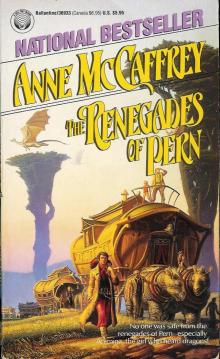 The Renegades of Pern (dragon riders of pern)
The Renegades of Pern (dragon riders of pern)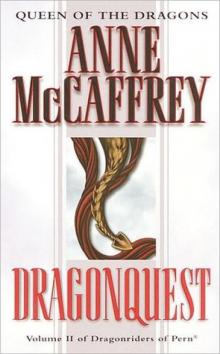 Dragonquest
Dragonquest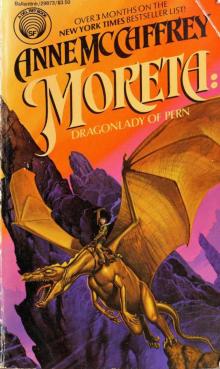 Moreta (Dragonlady of Pern)
Moreta (Dragonlady of Pern)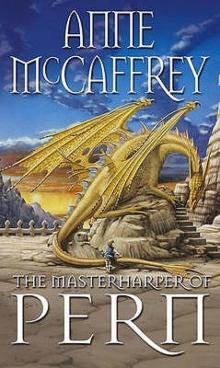 The Masterharper of Pern
The Masterharper of Pern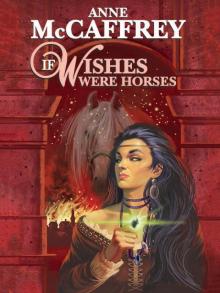 If Wishes Were Horses
If Wishes Were Horses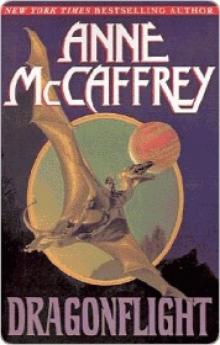 Dragonflight
Dragonflight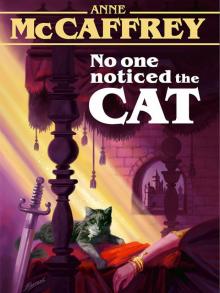 No One Noticed the Cat
No One Noticed the Cat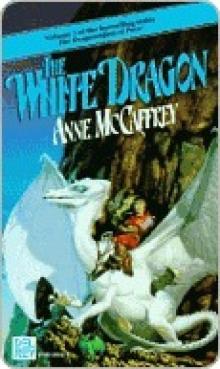 The White Dragon
The White Dragon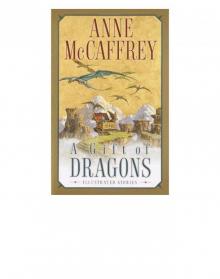 A Gift of Dragons
A Gift of Dragons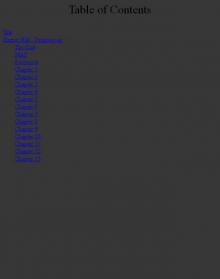 Harper Hall - Dragonsong
Harper Hall - Dragonsong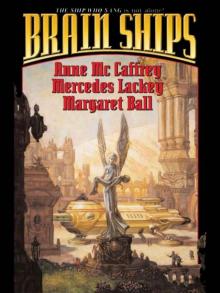 Brain Ships
Brain Ships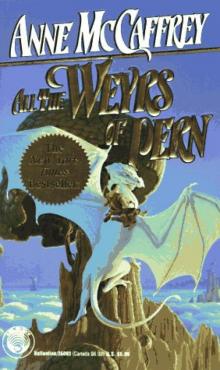 All The Weyrs of Pern
All The Weyrs of Pern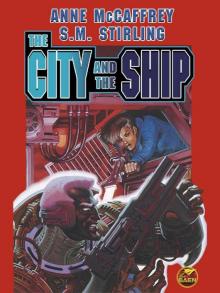 The City and the Ship
The City and the Ship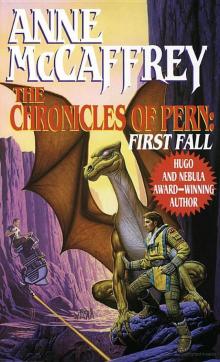 The Chronicles of Pern: First Fall
The Chronicles of Pern: First Fall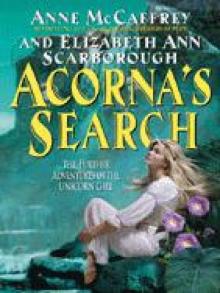 Acorna’s Search
Acorna’s Search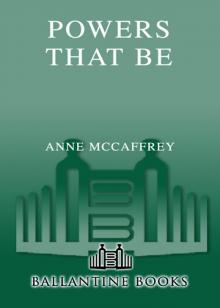 Powers That Be
Powers That Be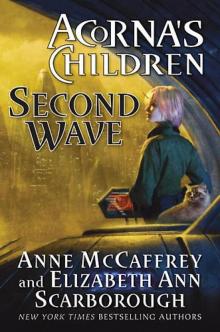 Second Wave
Second Wave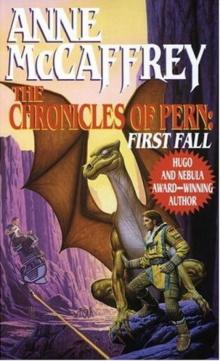 Chronicles of Pern (First Fall)
Chronicles of Pern (First Fall)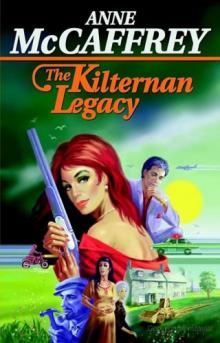 The Kilternan Legacy
The Kilternan Legacy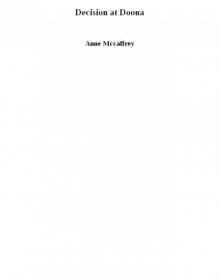 Decision at Doona
Decision at Doona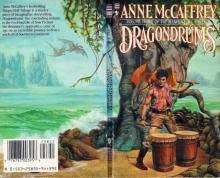 Dragondrums (dragon riders of pern)
Dragondrums (dragon riders of pern)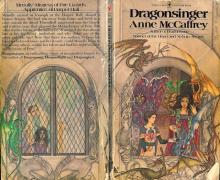 Dragonsinger (dragon riders of pern)
Dragonsinger (dragon riders of pern)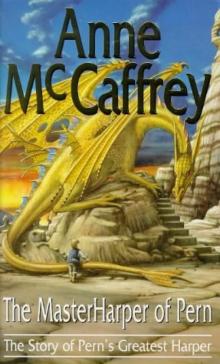 The Master Harper of Pern
The Master Harper of Pern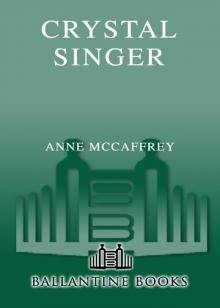 Crystal Singer
Crystal Singer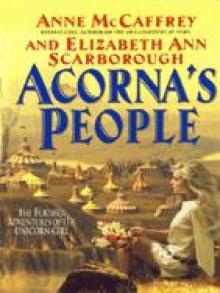 Acorna’s People
Acorna’s People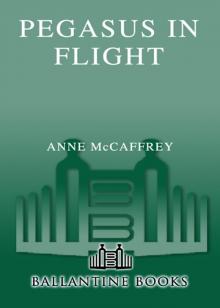 Pegasus in Flight
Pegasus in Flight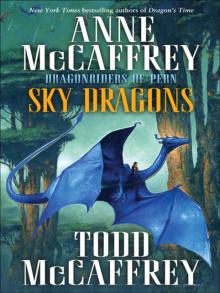 Sky Dragons Dragonriders of Pern
Sky Dragons Dragonriders of Pern Dragonriders of Pern 4 - Dragonsinger
Dragonriders of Pern 4 - Dragonsinger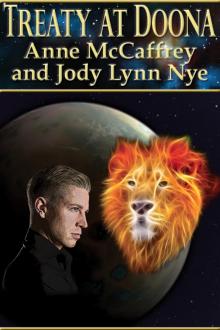 Treaty at Doona
Treaty at Doona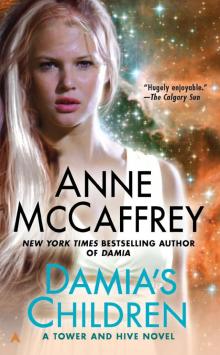 Damia's Children
Damia's Children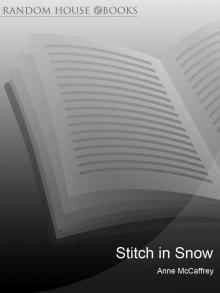 Stitch In Snow
Stitch In Snow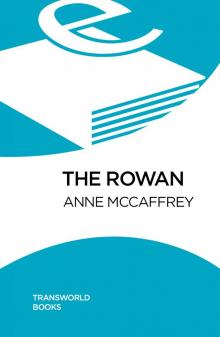 The Rowan
The Rowan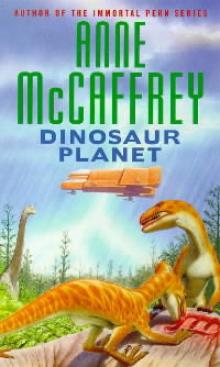 Dinosaur Planet
Dinosaur Planet The Year of the Lucy
The Year of the Lucy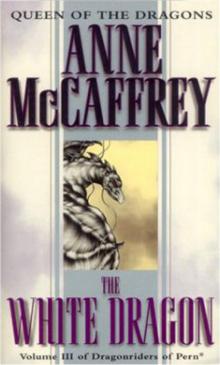 The White Dragon p-4
The White Dragon p-4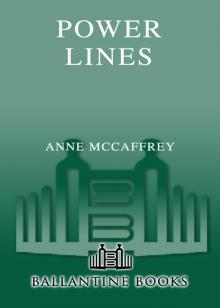 Power Lines
Power Lines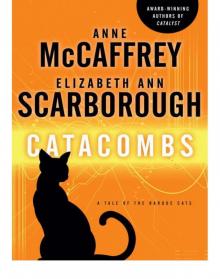 Catacombs
Catacombs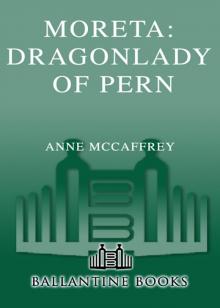 Moreta
Moreta Dragonsinger
Dragonsinger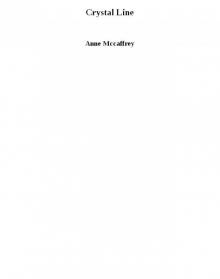 Crystal Line
Crystal Line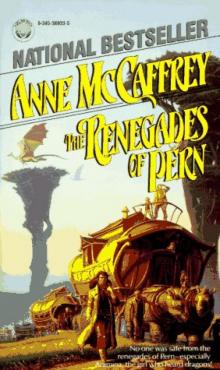 The Renegades of Pern
The Renegades of Pern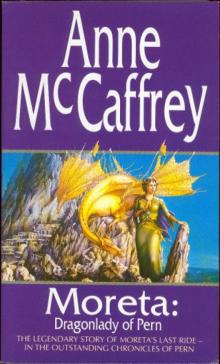 Moreta - Dragonlady of Pern p-8
Moreta - Dragonlady of Pern p-8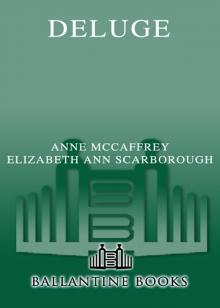 Deluge
Deluge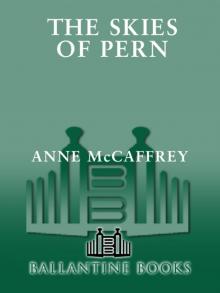 The Skies of Pern
The Skies of Pern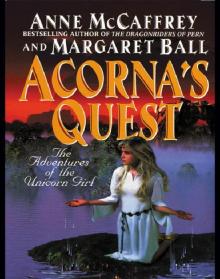 Acorna's Quest
Acorna's Quest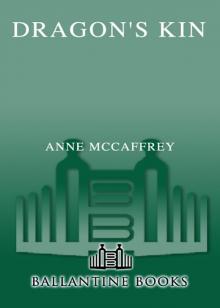 Dragon's Kin
Dragon's Kin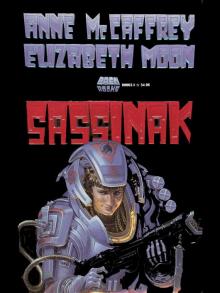 Sassinak
Sassinak![Crystal Universe - [Crystal Singer 03] - Crystal Line Read online](http://i1.bookreadfree.com/i1/03/31/crystal_universe_-_crystal_singer_03_-_crystal_line_preview.jpg) Crystal Universe - [Crystal Singer 03] - Crystal Line
Crystal Universe - [Crystal Singer 03] - Crystal Line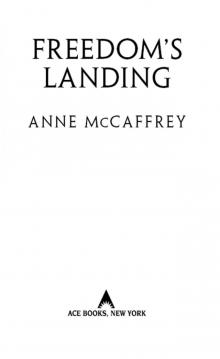 Freedom's Landing
Freedom's Landing Acorna’s Quest
Acorna’s Quest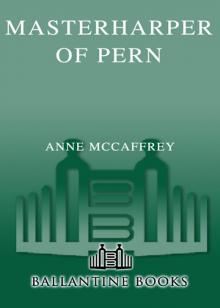 Masterharper of Pern
Masterharper of Pern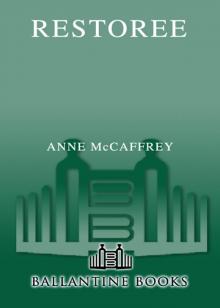 Restoree
Restoree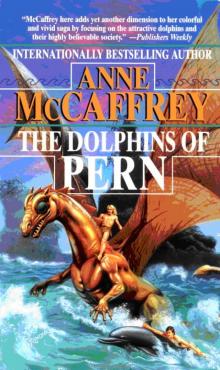 Dolphins of Pern
Dolphins of Pern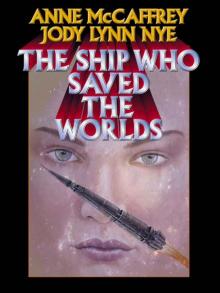 The Ship Who Saved the Worlds
The Ship Who Saved the Worlds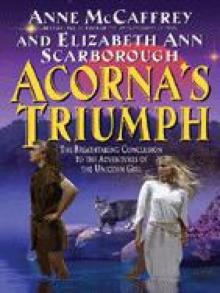 Acorna's Triumph
Acorna's Triumph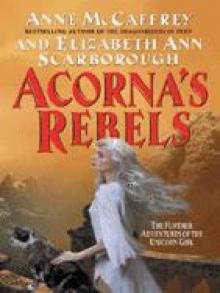 Acorna's Rebels
Acorna's Rebels![[Acorna 08] - First Warning: Acorna's Children (with Elizabeth Ann Scarborough) Read online](http://i1.bookreadfree.com/i1/04/06/acorna_08_-_first_warning_acornas_children_with_elizabeth_ann_scarborough_preview.jpg) [Acorna 08] - First Warning: Acorna's Children (with Elizabeth Ann Scarborough)
[Acorna 08] - First Warning: Acorna's Children (with Elizabeth Ann Scarborough)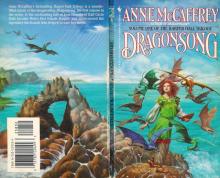 Dragonsong (dragon riders of pern)
Dragonsong (dragon riders of pern)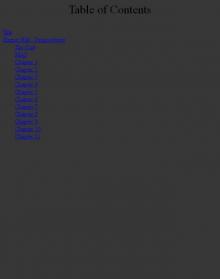 Dragonriders of Pern 6 - Dragondrums
Dragonriders of Pern 6 - Dragondrums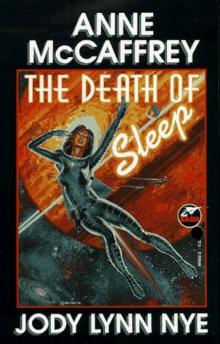 The Death of Sleep
The Death of Sleep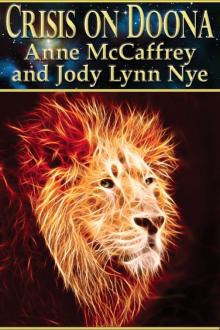 Crisis On Doona
Crisis On Doona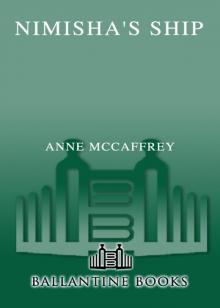 Nimisha's Ship
Nimisha's Ship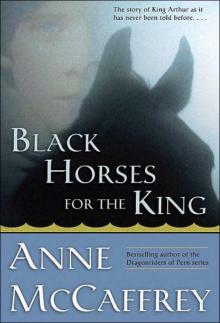 Black Horses for the King
Black Horses for the King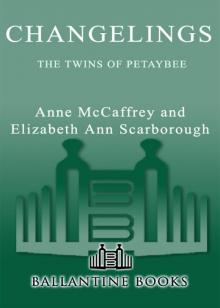 Changelings
Changelings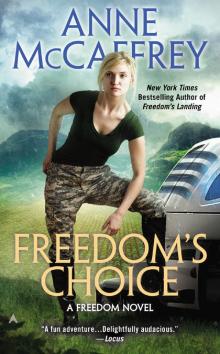 Freedom's Choice
Freedom's Choice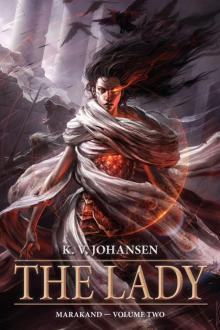 The Lady
The Lady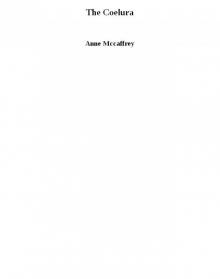 The Coelura
The Coelura Catalyst
Catalyst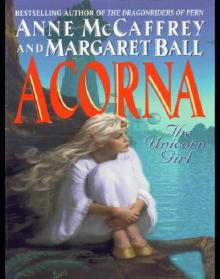 The Unicorn Girl
The Unicorn Girl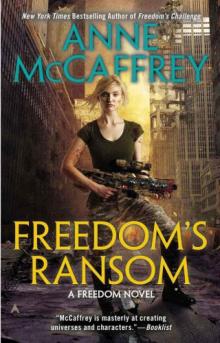 Freedom's Ransom
Freedom's Ransom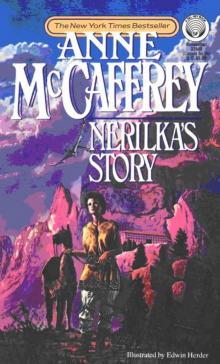 Nerilka's Story
Nerilka's Story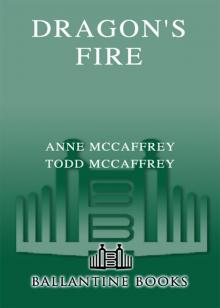 Dragon's Fire
Dragon's Fire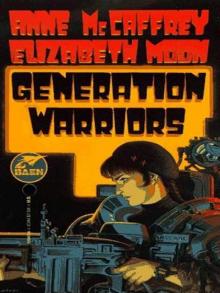 Generation Warriors
Generation Warriors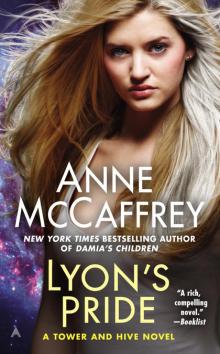 Lyon's Pride
Lyon's Pride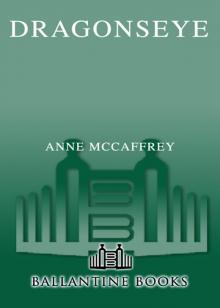 Dragonseye
Dragonseye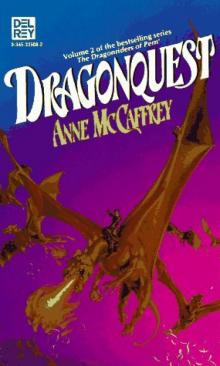 Dragon Quest
Dragon Quest Dragondrums
Dragondrums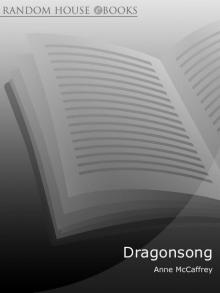 Dragonsong
Dragonsong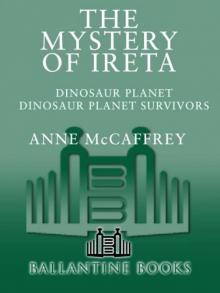 The Mystery of Ireta
The Mystery of Ireta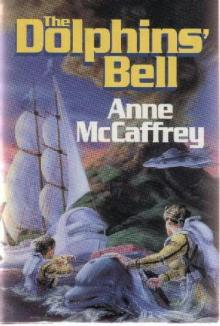 Dolphins' Bell
Dolphins' Bell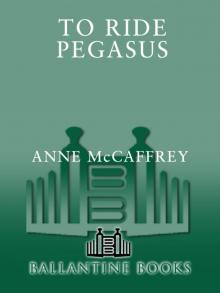 To Ride Pegasus
To Ride Pegasus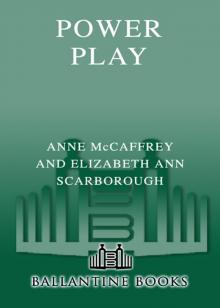 Power Play
Power Play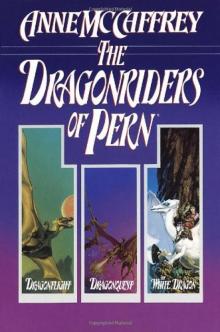 The Dragonriders of Pern
The Dragonriders of Pern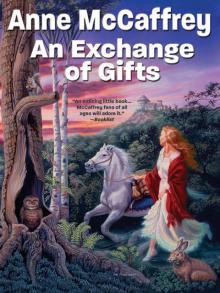 An Exchange of Gifts
An Exchange of Gifts The Ship Who Sang
The Ship Who Sang Sky Dragons: Dragonriders of Pern
Sky Dragons: Dragonriders of Pern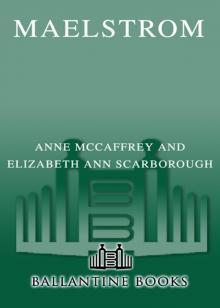 Maelstrom
Maelstrom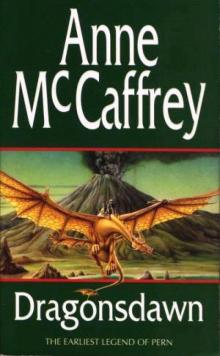 Dragons Dawn
Dragons Dawn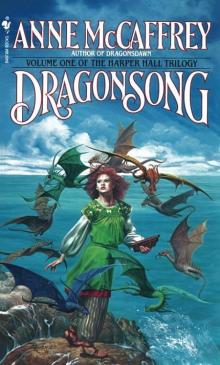 Dragon Song
Dragon Song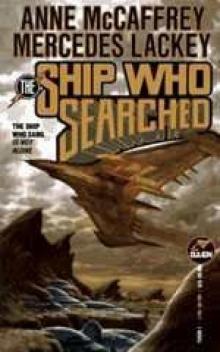 The Ship Who Searched b-3
The Ship Who Searched b-3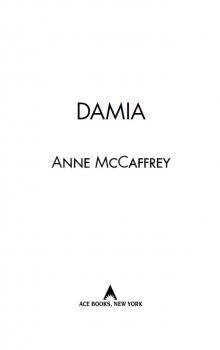 Damia
Damia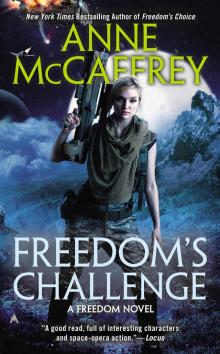 Freedom's Challenge
Freedom's Challenge